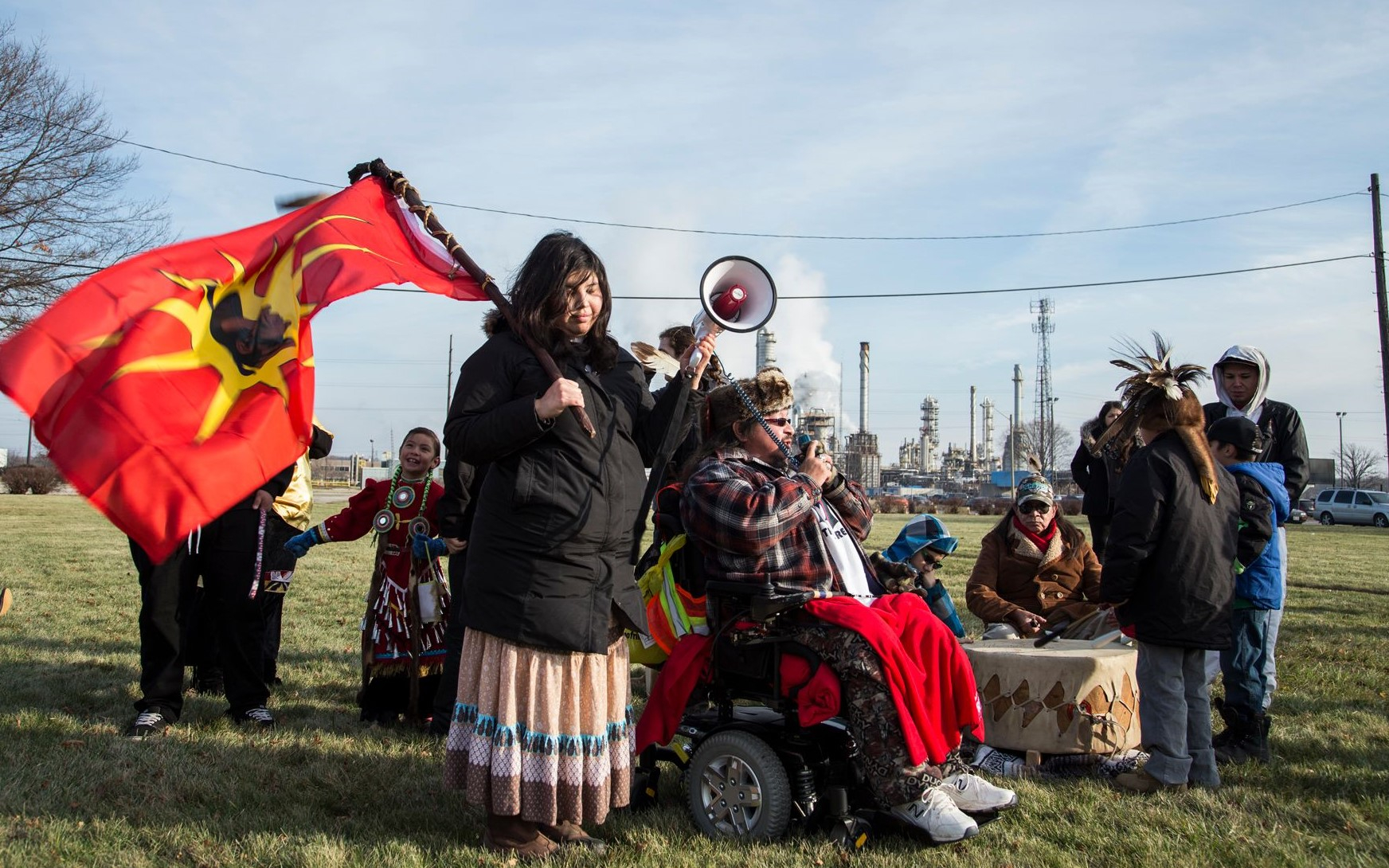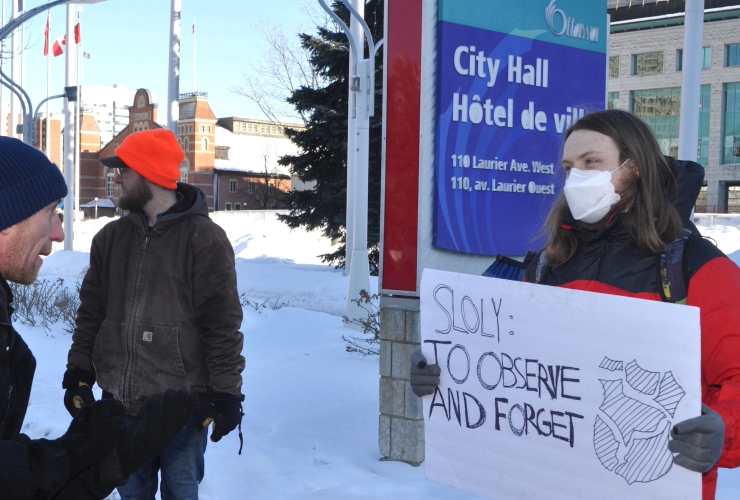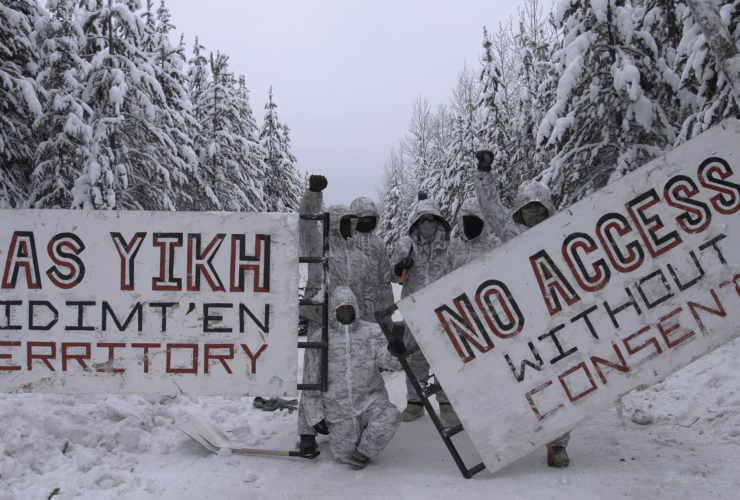Vanessa Gray — University of Toronto researcher, member of Aamjiwnaang First Nation and Indigenous land protector — sees herself as an educator. But in the eyes of the Canadian justice system, she is a criminal.
She has been arrested twice in her work as a land protector, and she says she interacts with law enforcement and security guards often. Still, the threat of police and criminalization is worth it for Gray — and for a reason. She grew up adjacent to Ontario’s Chemical Valley, which houses over 40 per cent of Canada’s petrochemical industry (that’s over 60 plants in a 25-kilometre radius).
“I know first-hand what environmental racism feels like, smells like, and how it emotionally sits on my shoulders every day,” Gray told Canada’s National Observer.
Gray says these days she is often in court, sometimes in class-action lawsuits, other times as a defendant in a criminal case.
In 2015, she was arrested for locking herself to a valve in a demonstration against the Line 9 pipeline that carries crude oil from Sarnia, Ont., to Quebec. All charges against her were dropped two years later.
In 2019, Gray was assaulted at a Liberal climate rally after disrupting Prime Minister Justin Trudeau’s speech. She was detained by police after the incident; the man who threw her to the ground wasn’t.
In December 2021, police arrived at her apartment lobby and Gray discovered there was a warrant out for her arrest over her alleged involvement in a solidarity action supporting land protectors on unceded Wet’suwet’en territory, who were the subject of a high-profile RCMP raid the month before.
Gray has been charged with three counts of mischief under $5,000, interference with property, causing disturbance, loitering, unlawful assembly, trespassing and failure to give the right of way. The case is currently before the court.
When Gray turned herself in, she was with friends and family. She defiantly wore a ribbon skirt to declare her connection to the land and her role in protecting it, which has made her a target.
Gray’s lawyer told her what was going to happen once she turned herself in, but the reality, she says, was different. She alleges Canadian Pacific Railway police handcuffed her behind her back while they brought her from Division 11 in downtown Toronto to CP police headquarters in Scarborough.
“I was treated like they needed to restrain me,” Gray says. “And I was so close to wearing my orange shirt, but I was afraid they were going to keep me overnight.”
Canada’s National Observer spoke with Gray on the effects of policing on her personal life and work.
This interview has been edited for clarity and concession.
You've spoken before about a pattern of law enforcement seeking to silence Indigenous land defenders and suppress Indigenous organizing. Can you talk about the tactic of persistent criminalization when it comes to Indigenous land defenders?
It’s hard for me to understand how this criminalization persists when we all know what colonization did and continues to do to our communities. I’ve done a lot of research on police violence, I have seen it, and my recent arrest was not the first time I experienced it. Even now, I overestimate the police’s quickness to resort to violence. Like other Indigenous women, I am afraid of the police.
But the moment we start second-guessing our actions is when the fear of police stops us from protecting our communities. But we just have to remember who we are as Indigenous peoples. We are going to get a lot of pushback from that, but that’s when we know we’re doing something right: when Canada sees us as a threat.
So I will not see myself as a criminal, just as my grandpa didn’t see himself as a criminal when he was taken to residential school.
There is a documented history of police surveillance of Indigenous land defenders. Vancouver Observer investigated this type of police scrutiny as far back as 2013; the book Policing Indigenous Movements does the same. Is police surveillance ever on your mind?
Of course. I think about how much funding gets sunk into police budgets and how much the RCMP continues to surveil Indigenous land protectors across Canada. For many years, the OPP (Ontario Police Service) called me, texted me, and reached out to me asking me to go for coffee or lunch because they just want to know what’s going on, and I didn’t even realize it was illegal or unjust for them to behave that way.
The hardest part about the surveillance — besides the police harassing me or showing up unannounced with no paperwork to explain their presence — is that being surveilled and criminalized impacts the people I care about most in the world, like my nephews. But then I remember that I’m doing this for them; I want them to be able to live on their territories unafraid and unsurveilled.
How do you find balance despite everything? What keeps you going?
I know that I’m supported by ancestors and by my community. I also find relief in researching colonial and police violence in Canada. I work as a researcher at an Indigenous-led lab at the University of Toronto where I work on issues that directly affect the health of the lands in my home community, Aamjiwnaang First Nation. Through my work, I hope that the communities impacted by the harms of the oil industry and police can find the strength, solidarity and tools to help the next generation resist policing and industrial violence.
Matteo Cimellaro / Local Journalism Initiative / Canada's National Observer






Comments